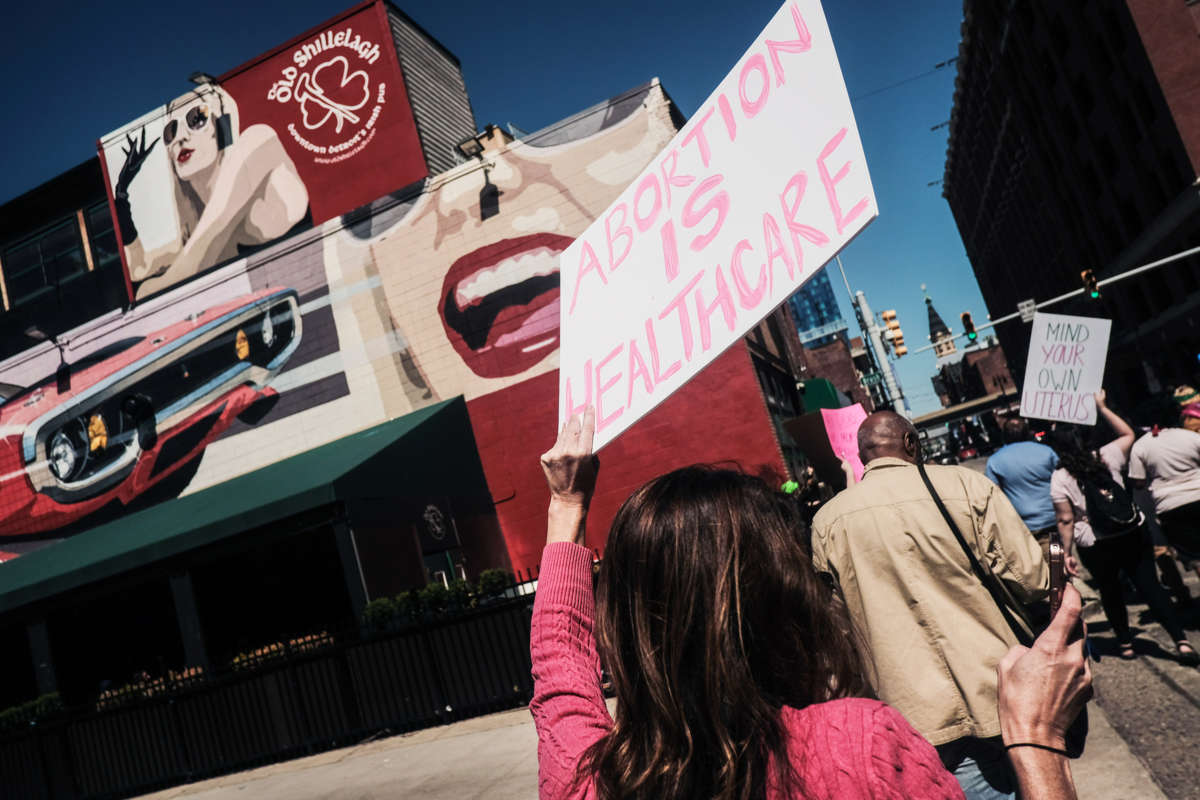When Stephanie Mejia Arciñiega drove her friend to a Planned Parenthood clinic in Ann Arbor, Michigan, they were surrounded by anti-abortion protesters as soon as they tried to park.
“They come up to your car super fast,” Mejia Arciñiega said. “You don’t want to run their feet over, so we had to stop and be like, ‘OK, no thank you.’ But then they started throwing a bunch of papers and resources at us. We tried to go inside, but we couldn’t.”
The clinic, which offers abortion care as well as birth control, cancer screenings, and STD treatment, has long been the target of anti-abortion protesters. Protesters’ efforts to limit abortions in the state may soon get a huge boost, if the Supreme Court strikes down Roe v. Wade.
In Michigan, this would have an immediate impact. Overnight, nearly all abortions would become a felony carrying a penalty of up to four years, even in cases of rape and incest. That’s because an old state law, last updated in 1931, was never repealed, even after Roe made it unenforceable in 1973.
Michigan Attorney General Dana Nessel, a Democrat, said she won’t enforce the law if it springs back into effect. But Michigan has 83 local county prosecutors, and Nessel said they could enforce the 1931 law. “I don’t think that I have the authority to tell the duly elected county prosecutors what they can and what they cannot charge,” Nessel told journalists.
Mejia Arciñiega, 18, who drove her friend to the Ann Arbor clinic, said she never imagined a world where abortion is illegal. “You wouldn’t think that in 2022, we’d be worrying about women’s rights, reproduction rights,” she said. “You wouldn’t want someone young that isn’t ready [to] have to have a baby because the law says ‘No.’ It’s not fair.”
The way the old state law is written, Nessel said, it’s possible that prosecutors could go after anyone who provides an abortion, as well as the person who takes medications to end their own pregnancy.
That could potentially “create a scenario where if a woman has self-aborted and she seeks medical care after that, will the doctor then have to report that to law enforcement?”
Speaking to reporters, Nessel also discussed the abortion she had years ago — one that would be illegal in the state if Roe falls. She was pregnant with triplets and doctors told her the embryos weren’t growing in utero, she said.
“And I was told very, very specifically that there was no way that all three would make it to term. But if I aborted one, that it was possible that the other two might live,” Nessel said. “I took my doctor’s advice … And you know what? It turned out that he was right. And now I have two beautiful sons.”
The 1931 law allows just one exemption: abortions “to preserve the life” of the woman. Yet doctors say they have no idea how to interpret that. Consider a woman who has severe heart disease with a 20% to 30% chance of dying during pregnancy.
“Is that enough of a chance?” asked Dr. Lisa Harris, a University of Michigan professor and OB-GYN, speaking this week on Michigan Radio’s Stateside. “I hate to even put it that way, but is that enough of a chance of dying that that person would qualify under Michigan’s ban for a lifesaving abortion? Or would their risk of dying need to be 50% or 100%?”
Or what if a pregnant person has cancer and needs to end the pregnancy to begin chemotherapy? “There’s not an imminent risk of dying, but there might be a risk of dying years later if they didn’t have chemotherapy,” Harris said. “So these are the kind of situations doctors are wondering about.”
It’s also unclear whether a woman whose pregnancy would become life-threatening only in its later stages would be required to delay termination until then.
“We see people with things like kidney disease or other problems, where they’re actually OK during early pregnancy. But if the pregnancy were to continue and they were to give birth, then they would have a very high chance of dying,” Harris explained.
The state legislature is controlled by Republicans, but Michigan Gov. Gretchen Whitmer, a Democrat, filed a preemptive lawsuit last month seeking to block the 1931 law from taking effect. Planned Parenthood filed a similar suit as well. And a campaign to collect enough signatures is underway to put abortion on the ballot in November. But that would be months after the U.S. Supreme Court makes its final ruling on Roe, which is expected in late June or early July.
In the meantime, the confusion and uncertainty caused by the 1931 law could be enough for some health care professionals to stop offering abortions, Nessel said.
“I think that this will have the kind of chilling effect that doctors just simply will not perform this procedure really under any set of circumstances, because they don’t want to get dragged into court,” she said. “They don’t want to face the possibility of being prosecuted and the possibility of going to jail or prison. So I think that that, honestly, you’ll have doctors that really have to violate their Hippocratic oath and just say, ‘I’m sorry, I can’t help you.’”
This story is part of a partnership that includes Michigan Radio, NPR and KHN.
Media that fights fascism
Truthout is funded almost entirely by readers — that’s why we can speak truth to power and cut against the mainstream narrative. But independent journalists at Truthout face mounting political repression under Trump.
We rely on your support to survive McCarthyist censorship. Please make a tax-deductible one-time or monthly donation.
